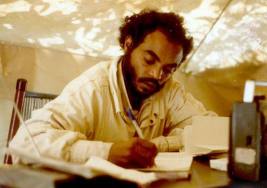Leader of TPLF & EPRDF

Meles interrupted his univeristy studies in 1974 and travelled back to the Tigray to join the Tigray People's Liberation Front (TPLF) which was set up when the student Tigraean National Organization decided to launch armed struggle against the military dictatorship, the Derg, in February 1975. His first name at birth was "Legesse". He later changed his name to Meles, in honour to a student activist and fellow Tigrayan "Meles Tekle" who was executed by military dictatorship (the Derg) in 1975.
A little over a year after joining TPLF, he became an alternate member of the Central Committee and a full member in 1979. What contemporaries described as "his immense intelligence, political acumen, extraordinary command of languages (Tigrinya, Amharic and English), and rhetorical brilliance" rapidly brought him to prominence in the TPLF.
He was chosen to lead the TPLF's cadre school set up in 1983 at the TPLF's Second Organizational Conference and was elected to the TPLF's Leadership Committee in 1979 and to its Executive Committee in 1983. He was subsequently elected head of both the TPLF and of the Marxist-Leninist League of Tigray (MLLT). He became chairman of both the TPLF and the Ethiopian Peoples' Revolutionary Democratic Front (EPRDF) in 1989, a coalition incorporating four main political organisations in the country to broaden the ethnic makeup of revolution to overthrow of the Mengistu Hailemarim regime.
After the ERPDF swept into Addis Ababa in May 1991, and the military dictatorship collapsed, Meles, as Chairman of the EPRDF, became President of the Transitional Government and Chairman of the Council of Representatives, the legislative body of the transitional government until 1995.
First elections organised under the new Federal Constitution drawn up in 1994 and promulgated in August 1995, the EPRDF swept to power; the Federal Democratic Republic of Ethiopia was proclaimed, and Meles became Ethiopia's first prime minister.
In 1998, Eritrea invaded Badme, northern Ethiopia which ceded from Ethiopia in 1993. After Prime Minister Meles successfully defended Ethiopia's sovereignty and Ethiopia declared victory in May 2000. Seven months later, the two countries signed a peace treaty.
In May 2005, Ethiopians voted in a poll billed as the country's first democratic election. The opposition Coalition for Unity and Democracy (CUD) claimed that the EPRDF fixed the election outcome which was encouraged by an EU report criticising the conduct of the election. The CDU organised a protest which culminated in violence and damaged people's property in Addis Ababa. Meles government stepped in to protect the people's livelihood, and to enforce law and order. Since then the opposition lost credibility and support in cities and towns by the Ethiopian people.
Prime Minister Meles took an interest in Somalia political situation as he believed Ethiopia's sovereign integrity would be affected. In December 2006, Ethiopia sent troops into Somalia to drive Islamists from power. Ethiopia announced plans to keep its troops in Somalia until the Horn of Africa nation ratifies a constitution and its military is able to fend off militant threats. Ethiopian troops withdrew from Somalia in January 2009 after a successful campaign.
In December 2009, Prime Minister Meles Zenawi represented Africa at the Copenhagen climate talks, cementing his position as one of the continent's leading statesmen despite opposition claims of autocratic tendencies. Meles said; "Africa would be hardest hit by the effects of climate change". He subsequently appealed to the conference for a finance deal whereby rich countries would fund schemes to help poor states adapt to climate change and embrace clean technology.
In May 2010, The EPRDF won a landslide victory in the national election, claiming 499 out of 547 seats. The result meant a fourth term as prime minister for Meles Zenawi and he continued the economic development of the country by pursuing ambitious national projects one of them is to build the Grand Renaissance Dam.
In July 2012, Prime Minister Meles missed the African Union summit in Addis Ababa due to illness and went back to hospital for emergency treatment. He died on Monday, 20th August 2012. Ethiopia lost a visionary and hardworking leader who cared for all Ethiopians. He will be missed greatly.
Source: www.meleszenawi.gov.et